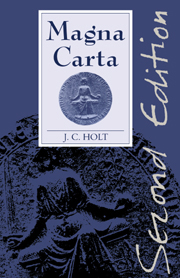Book contents
- Frontmatter
- Dedication
- Contents
- List of plates
- Preface
- Preface to second edition
- Acknowledgements
- Abbreviations
- 1 The Charter and its history
- 2 Government and society in the twelfth Century
- 3 Privilege and liberties
- 4 Custom and law
- 5 Justice and jurisdiction
- 6 Crisis and civil war
- 7 Quasi Pax
- 8 The quality of the Great Charter
- 9 The achievement of 1215
- 10 From distraint to war
- 11 The re-issues and the beginning of the myth
- Appendices
- References
- Index
6 - Crisis and civil war
Published online by Cambridge University Press: 05 October 2014
- Frontmatter
- Dedication
- Contents
- List of plates
- Preface
- Preface to second edition
- Acknowledgements
- Abbreviations
- 1 The Charter and its history
- 2 Government and society in the twelfth Century
- 3 Privilege and liberties
- 4 Custom and law
- 5 Justice and jurisdiction
- 6 Crisis and civil war
- 7 Quasi Pax
- 8 The quality of the Great Charter
- 9 The achievement of 1215
- 10 From distraint to war
- 11 The re-issues and the beginning of the myth
- Appendices
- References
- Index
Summary
Magna Carta reflects two distinct conditioning circumstances. On the one hand it emerged from the increasing maturity of European political thought and practice, from the concept of rule according to law, from the demand for the preservation of the rights of subjects within a feudal and ecclesiastical hierarchy and from routine patterns of government which went with more disciplined and sophisticated forms of administration. On the other hand it was a product of a political crisis. It sprang directly from the flexibility and severity of Angevin methods of government under the ruthless and capable direction of King John, from the urgent requirements imposed by foreign wars for the defence and, after 1204, the recovery of Normandy, and from the final collapse of John's military and diplomatic schemes on the field of Bouvines in July 1214.
Thus the Charter was not simply a Statement of administrative practices, or desired regulations or principles of law. These were no more than the terms of reference establishing broad limits within which the opposing parties made their demands, or compromised and hedged, or sought hidden advantages, or skilfully provided escape routes from the letter of the documents. The Charter and its associated documents are complex records which bear the imprint of nearly three years of political crisis and protracted, discontinuous negotiation.
- Type
- Chapter
- Information
- Magna Carta , pp. 188 - 236Publisher: Cambridge University PressPrint publication year: 1992



